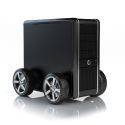Computerware Blog
Think Twice Before Moving Your PC
If your PC is powered on, then your hard drive platters are spinning at these extreme speeds. The only time your hard drive takes a break is when the computer is turned off. In fact, one reason why many users choose to keep their computers always powered-on, is because it takes a big electrical jolt to the computer's system to have a hard drive go from 0-to-15,000 rpms in only a few seconds.
Once a hard drive is warmed up and going strong, the spinning platters create a gyroscopic effect that keeps all the tiny parts from crashing into each other at high speeds. That is, unless something should happen to your hard drive to disrupt this precise gyroscopic science. If this effect is disrupted, then you will experience what is commonly referred to as a computer crash, which will destroy the data on your hard drive--this is why it's important to backup your hard drive.
One big threat to hard drives is movement. A computer that's moved while the platters are spinning can disrupt this gyroscopic effect and cause critical damage. If you need to move your PC tower, or even your exterior hard drive, it's best practice to first turn off your machine.
Another type of hard drive damaging-movement to be aware of are vibrations. Whether your office is located next to train tracks, or maybe you enjoy blasting music so loud that your furniture vibrates every time the bass drops, you should be aware of the effect that these vibrations are having on your hard drive. While mild vibrations won't instantly kill your hard drive, it could cause damage over an extended period of time. You need to especially be aware of this risk if you work in an environment that uses heavy machinery.
These risks apply to disk hard drives of any size. You may be surprised to learn that even laptops are not immune to being negatively affected by movement. Laptops are designed to have a little extra support than their desktop counterparts, but even so, you will still want to keep laptop movement to a minimum while the machine is powered-on. This is one reason you don't see people jogging while listening to music from a laptop strapped to their back. Although, if you must exercise with a laptop, then we recommend using a laptop with a Solid State Drive because it has no moving parts.
It's always best practice to be aware of how your environment is affecting your computer. Whether its vibrations, dust, or faulty electrical wiring, sometimes the biggest threat to your PC may be from the outside. If you would like Computerware to assess your IT infrastructure and point out the risks, both interior and exterior, then call us at (703) 821-8200.


Comments